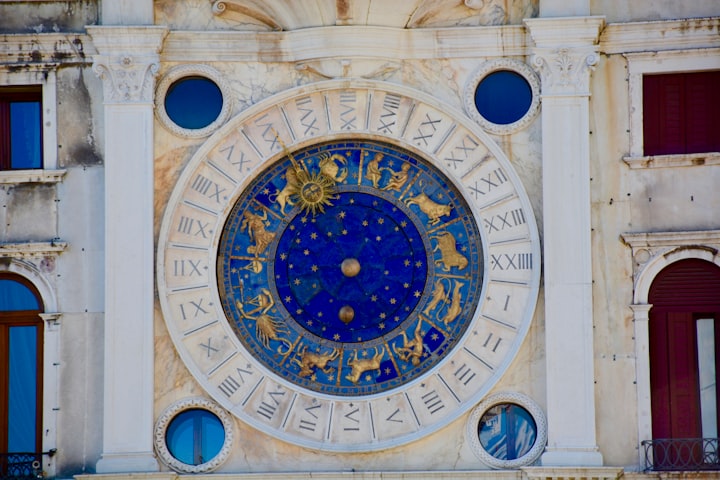Why Has Astrology Been Supressed?
An objective look into astrology and wave phenomena

I worked for many years as a professional astrologer and yes, I can already hear some of you scoffing! We’re taught from a young age that astrology is a pseudoscience, a form of fortune telling, something for bored housewives to gossip over. The stars couldn’t possibly have any effect on us, could they?
Let’s take an objective look at what astrology is and discern why the vast knowledge encompassing it has been hidden and suppressed from society for so long.
Who invented astrology? Where does it arise from you ask? The ancient Babylonians, Egyptians, Vedas, Mayans and Greeks are the main cultures that come to mind. These societies used the stars to tell time, create calendars, offer predictions and make major decisions. The ones who kept the knowledge of astrology were usually priests who worked very closely with the nobles. Astrologers were venerated members of society because astrology, back then, was seen as a gateway to the divine.
The Vedas in particular viewed astrology as a kind of sacred science. Let’s look at Wikipedia’s definition of the word science:
“Science (from the Latin word scientia, meaning "knowledge") is a systematic enterprise that builds and organizes knowledge in the form of testable explanations and predictions about the universe.”
While there is a lot of math and observations involved in astrology and it may seem to be a tool for predictions, it’s still seen as a pseudoscience because the predictions are inconclusive and not 100% repeatable. However, this only seems to ring true when we’re looking at the physical world.
Astrology is a language that anyone can learn to read. The stars are the clock that show where we are in a greater cycle of time. Just because the majority of the population doesn’t know how to read that clock, doesn’t mean that these greater cycles don’t exist.
Since childhood, we’ve been indoctrinated to believe that we are merely accidental creations made of particles. We are little bodies walking around on a planet and there isn’t some grand design. Only what we can see can be proved to exist, or does it?
Science also reminds us that every particle we see is also a wave. What does this mean? Underneath the physical forms we cling to for a sense of security in this chaotic world, there’s an entire other world to explore.
We experience wave phenomena all the time and don’t think too much of it. We listen to music, which we cannot see, and yet we know it exists and we appreciate it. We feel energy run throughout our entire body but we can’t see it, just experience and measure its correlates: bioluminescence, bioelectricity, consciousness, etc. We can’t measure love, yet we know it’s there. Some would even go as far as saying that love is what we’re made of, the only thing that does exist!
The most beautiful things about the human experience aren’t always physical and cannot be proved with scientific experiments, and yet they continue to impact and inspire our daily lives. The bigger question we need to be asking ourselves is why have we been told to only focus on that which we can see? Why has the particle world been deemed so important when we only focus on it to achieve wave satisfaction?
We work our 9-5 jobs to buy our big houses and cars and boats to feel happy and emotionally connected to other humans. The media constantly asserts that we’re incomplete beings who must buy things in order to feel whole, to be accepted. Mainstream religion reminds us that we are sinners who must look outward for forgiveness, for power.
This patriarchal nonsense has to end!
The governments who create the education our children consume are funded by corporations who profit off our fear and ignorance. They do not want us awakening to the greater perspective that we truly are all one.
Perhaps we’re not just bodies walking around on a planet, inside of a universe, but rather, we are the universe and we’re walking around within our own minds.
We have to dig deeper into what the nature of consciousness actually is. Is it centralized in your head or does it expand into your body and beyond? Are you a collection of thoughts, your job, your personality, or something much larger?
Are you in fact a part of nature and if so, why has this knowledge been suppressed? For greed, for profit, for power?
While astrology will never be seen as a physical science, it’s most definitely a beautiful tool to discern the wave cycles we’re collectively experiencing. With a deeper look into astrology, beyond the mundane and sometimes ridiculous horoscopes we see in the paper, we see that it can be used as a form of psychology.
It’s important to recognize that the stars never take us away from our free will. They serve to reflect what’s going on within the consciousness of humanity.
Hermes Trismegistus eloquently shares, “As above so below, as within so without, as the universe, so the soul.” The plain undeniable fact is that we are not separate from the universe. We are an intrinsic part of it.
Personally, I’ve always thought of the stars as a map of our soul, a look into our psyche. The microcosm seems to be reflected in the macrocosm, the same sacred geometry spiraling out into infinity. No, we don’t get taught this in school but yes, it’s still valuable.
Imagine if we began to ask these greater questions instead of distracting ourselves with social media! If we started to see that we were much more than just humans, perhaps some of our systems would start to crumble. Perhaps some intuitions that profit off of our ignorance would perish.
Perhaps we would see that our power comes from within.
The stars are an entryway into the awakening of consciousness. They show us what energy is available to us and then the choice becomes yours.
Will you continue to fight against life or flow with current?






Comments
There are no comments for this story
Be the first to respond and start the conversation.